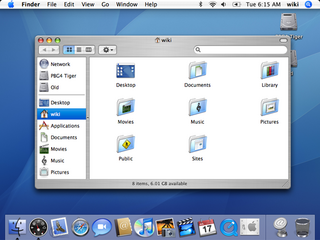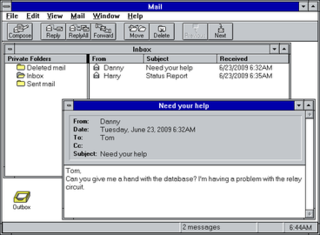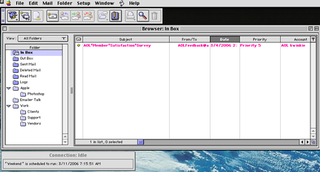A major contributor to this article appears to have a close connection with its subject.(August 2010) |
Eudora Internet Mail Server (EIMS) is a POP3, IMAP, and SMTP server for the classic Mac OS and macOS.
A major contributor to this article appears to have a close connection with its subject.(August 2010) |
Eudora Internet Mail Server (EIMS) is a POP3, IMAP, and SMTP server for the classic Mac OS and macOS.
In 1993 Glenn Anderson started development on what was then called MailShare, which was available as freeware. In 1995 MailShare was purchased by Apple Computer and renamed to Apple Internet Mail Server. Version 1.0 to 1.2 were released under that name. In 1997 Apple Internet Mail Server was purchased by Qualcomm and renamed to Eudora Internet Mail Server. Version 1.3 was released as freeware by Qualcomm. Versions 2.0 to 3.0 were released by Qualcomm as a commercial product. In 2001 Qualcomm licensed EIMS back to Glenn Anderson, who has released versions 3.1, 3.2 and 3.3. As of April 2024, the latest version is 3.3.10 of 30 Oct 2022, and the payment processor is Kagi that went out of business on 31 July 2016 (making it impossible to buy a licence), suggesting that the project might have become abandoned. The server software also handles the ACAP and LDAP services.

Mac OS X Server is a series of discontinued Unix-like server operating systems developed by Apple Inc. based on macOS. It provided server functionality and system administration tools, and tools to manage both macOS-based computers and iOS-based devices, network services such as a mail transfer agent, AFP and SMB servers, an LDAP server, and a domain name server, as well as server applications including a Web server, database, and calendar server.
The history of macOS, Apple's current Mac operating system formerly named Mac OS X until 2011 and then OS X until 2016, began with the company's project to replace its "classic" Mac OS. That system, up to and including its final release Mac OS 9, was a direct descendant of the operating system Apple had used in its Mac computers since their introduction in 1984. However, the current macOS is a UNIX operating system built on technology that had been developed at NeXT from the 1980s until Apple purchased the company in early 1997.

Eudora is an email client that was used on the classic Mac OS, Mac OS X, and Microsoft Windows operating systems. It also supported several palmtop computing platforms, including Newton and the Palm OS. Eudora was succeeded by Eudora OSE. In 2018, after being years out of print, the software was open-sourced by the Computer History Museum.

Bonjour is Apple's implementation of zero-configuration networking (zeroconf), a group of technologies that includes service discovery, address assignment, and hostname resolution. Bonjour locates devices such as printers, other computers, and the services that those devices offer on a local network using multicast Domain Name System (mDNS) service records.

System 7 is the seventh major release of the classic Mac OS operating system for Macintosh computers, made by Apple Computer. It was launched on May 13, 1991, to succeed System 6 with virtual memory, personal file sharing, QuickTime, TrueType fonts, the Force Quit dialog, and an improved user interface.
The Apple Filing Protocol (AFP), formerly AppleTalk Filing Protocol, is a proprietary network protocol, and part of the Apple File Service (AFS), that offers file services for macOS, classic Mac OS, and Apple II computers. In OS X 10.8 Mountain Lion and earlier, AFP was the primary protocol for file services. Starting with OS X 10.9 Mavericks, Server Message Block (SMB) was made the primary file sharing protocol, with the ability to run an AFP server removed later in macOS 11 Big Sur. AFP supports Unicode file names, POSIX and access-control list permissions, resource forks, named extended attributes, and advanced file locking.
MkLinux is an open-source software computer operating system begun by the Open Software Foundation Research Institute and Apple Computer in February 1996, to port Linux to the PowerPC platform, and Macintosh computers. The name refers to the Linux kernel being adapted to run as a server hosted on the Mach microkernel, version 3.0.

Mac OS X Tiger is the 5th major release of macOS, Apple's desktop and server operating system for Mac computers. Tiger was released to the public on April 29, 2005 for US$129.95 as the successor to Mac OS X 10.3 Panther. Included features were a fast searching system called Spotlight, a new version of the Safari web browser, Dashboard, a new 'Unified' theme, and improved support for 64-bit addressing on Power Mac G5s. Mac OS X 10.4 Tiger also had a number of additional features that Microsoft had spent several years struggling to add to Windows with acceptable performance, such as fast file searching and improved graphics processing.
Tidbits is an electronic newsletter and web site dealing primarily with Apple Inc. and Macintosh-related topics.

Microsoft Mail was the name given to several early Microsoft e-mail products for local area networks, primarily two architectures: one for Macintosh networks, and one for PC architecture-based LANs. All were eventually replaced by the Exchange and Outlook product lines.

Mac OS X Server 1.0 is an operating system developed by Apple, Inc. released on March 16, 1999. it was the first version of Mac OS X Server.

Claris Emailer is a discontinued e-mail client for the classic Mac OS created by Fog City Software. It was bought and marketed by the Apple Inc. subsidiary Claris. In addition to internet email, it supported sending and receiving email to online services such as AOL, Applelink, Compuserve. It was the only third-party e-mail client licensed to directly access AOL e-mail. Additionally, it was one of the first commercial applications to support the Internet Config preferences management system.
Flash Video is a container file format used to deliver digital video content over the Internet using Adobe Flash Player version 6 and newer. Flash Video content may also be embedded within SWF files. There are two different Flash Video file formats: FLV and F4V. The audio and video data within FLV files are encoded in the same way as SWF files. The F4V file format is based on the ISO base media file format, starting with Flash Player 9 update 3. Both formats are supported in Adobe Flash Player and developed by Adobe Systems. FLV was originally developed by Macromedia. In the early 2000s, Flash Video was the de facto standard for web-based streaming video. Users include Hulu, VEVO, Yahoo! Video, metacafe, Reuters.com, and many other news providers.
Eudora OSE, formerly codenamed Penelope, is an extension for the Mozilla Thunderbird email client software implementing some features of Eudora.

Info-Mac is an online community, news aggregator and shareware file hosting service covering Apple Inc. products, including the iPhone, iPod and especially the Macintosh. Established in 1984 as an electronic mailing list, Info-Mac is notable as being the first online community for Apple's then-new Macintosh computer. Info-Mac was the dominant Internet resource for Mac OS software and community-based support throughout the 1980s and early 1990s.
MobileMe is a discontinued subscription-based collection of online services and software offered by Apple Inc. All services were gradually transitioned to and eventually replaced by the free iCloud, and MobileMe ceased on June 30, 2012, with transfers to iCloud being available until July 31, 2012, or data being available for download until that date, when the site finally closed completely. On that date all data was deleted, and email addresses of accounts not transferred to iCloud were marked as unused.
Qpopper was one of the oldest and most popular server implementations of POP3. As a free and open-source server distributed under BSD style license, it was a common choice for Internet Service Providers, schools, corporations, and other organizations. It was included in several Linux and Unix distributions.
Dejal is a company that develops software for Mac OS X. Established by developer David Sinclair in 1991 in Auckland, New Zealand and since relocated to Portland, Oregon, the company develops and distributes a variety of shareware and freeware applications. Dejal has also released a number of open source projects to be used by other Mac developers in their software.